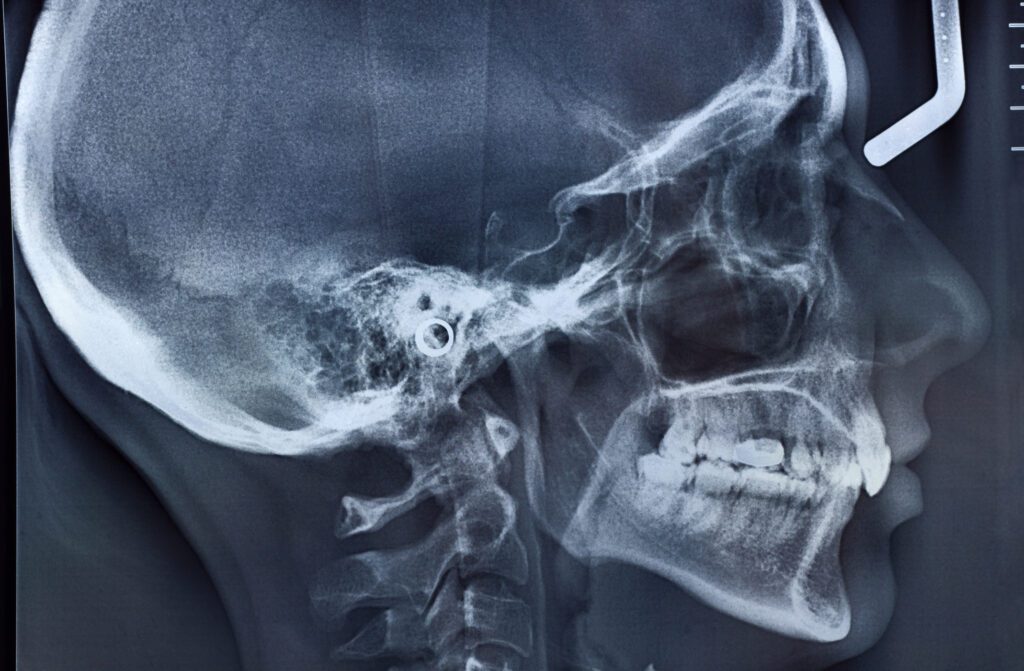If we think about oral health, we might focus solely on our teeth. But your oral health is much more complicated. Your teeth, soft tissues, and jaw all make up the puzzle pieces that make up your oral health. If there is an issue with one piece, there is a problem with the rest of the puzzle. One essential part of your oral health is your jaw. If you have frequent jaw pain or feel pain when eating chewy or hard foods, you may need TMJ treatment in Chicago, IL, and Arlington Heights, IL.
TMJ treatment is part of our restorative dentistry services. Restorative care can address issues with multiple components of your health to restore balance and function to your smile.

Why Your Jaw Is Essential
Your jaw influences your oral health for many reasons. For example, your jawbone determines the alignment of your teeth. It creates the foundation for a beautifully aligned smile. When your jaw is in sync, your teeth work together seamlessly.
The joint that connects your jaw to your skull is the TMJ or temporomandibular joint. It is essentially the unsung hero behind your ability to chew, speak, and even express yourself. If your TMJ isn’t happy, you might experience jaw pain, clicking sounds, or even headaches. The dysfunction of your jaw joint is called temporomandibular joint disorder (TMD); however, most patients simply call this issue TMJ.
TMJ Symptoms
You can experience a wide range of issues with TMJ. Common TMJ symptoms include:
- Teeth clenching and grinding (bruxism)
- Chronic headaches
- Ear pain and ringing
- Jaw pain
- Difficulty biting and chewing
Do you wake up with jaw pain or tenderness throughout the day? TMJ issues can often manifest as discomfort in the jaw joint. Many patients complain of jaw pain and tenderness.
You may notice clicking or popping sounds. A clicking or popping sound when you open or close your mouth can be a sign of TMJ issues. Without treatment, this can worsen over time. You can also face challenges with chewing. In severe cases, the jaw may lock in an open or closed position. Jaw problems can affect your ability to speak and eat.
Comprehensive Analysis and Treatment
Your well-being is our top priority. Our team goes beyond the surface to conduct a thorough exam and evaluation of your TMJ. We also assess your oral health to understand what is causing your jaw issues.
Your bite, or the way your upper and lower teeth come together, is a crucial part of your oral health. An imbalanced bite can contribute or worsen TMJ issues. This can affect your jaw joint as well as the surrounding muscles and teeth.
Our team uses advanced diagnostic tools and techniques to analyze your bite thoroughly. This involves assessing how your teeth meet when you close your mouth. As a result, we can identify any misalignments or irregularities.
We Treat the Entire Picture
TMJ issues are often connected with various elements of your oral health. Treating only the symptoms may provide temporary relief. But a comprehensive approach addresses the root causes to offer long-lasting results.

TMJ Treatment in Chicago, IL
We provide custom TMJ nightguards, also known as oral splints. Before treatment, we will take X-rays of your mouth to determine if this option is right for you.
To create the splint, we will take impressions of your teeth that we send to a lab. The lab will create the mouthguard from durable plastic. Once your nightguard is ready, we’ll have you come back to the office to try it on. We’ll make sure it fits perfectly and feels comfortable.
You will wear your mouthguard at night to protect your teeth, reduce stress on the jaw, and stop teeth clenching and grinding.
Can physical therapy or lifestyle changes treat TMJ?
Yes, physical therapy and lifestyle changes can treat mild or moderate TMJ symptoms. A physical therapist can teach you specific exercises to stretch and strengthen the muscles around your jaw. These exercises can help reduce pain, improve flexibility, and make it easier to open and close your mouth.
Gentle massage of the jaw, neck, and shoulder muscles can help relax tight areas, improve blood flow, and ease discomfort. This can be done by a therapist or at home with guidance.
Lifestyle changes can also reduce TMJ pain. Foods like gum, hard candies, nuts, or tough meats can strain your jaw joint. Stick to softer foods like yogurt, mashed potatoes, or soups to give your jaw a break while it heals.
Try not to open your mouth too wide when you yawn or bite. These movements can overwork your jaw joint and make symptoms worse.
Patient Review
TMJ Treatment FAQs
Read answers to common questions about TMJ treatment in Arlington Heights and Chicago, IL:
Will I need TMJ surgery?
Most people with TMJ disorders don’t need surgery. But if you’ve tried non-surgical treatments for a long time and still have severe pain or jaw problems, surgery might be an option.
You may also need surgery for advanced TMJ. Surgery can fix a severely damaged or dislocated TMJ joint. Surgery is usually a last resort. We will explore all other options first.
Can ice or heat treat TMJ pain?
At home, you can apply a warm compress or ice pack to your jaw can help reduce swelling and relieve pain. Heat can relax tight muscles. Ice can numb pain and reduce inflammation. Do not use ice or heat for more than 15 minutes at a time.
Can poor posture make TMJ pain worse?
Yes. Poor posture in your neck and shoulders can put extra pressure on your jaw joint. If you notice that you’re hunching your back, practice sitting and standing up straight. Also, make sure your computer or phone is at eye level to avoid slouching.
Can TMJ cause ear pain?
When the TMJ isn’t functioning properly, the pain often spreads to nearby areas. The discomfort may feel like an earache, even though there’s nothing wrong with your ears themselves. This referred pain occurs because the jaw joints share nerves and muscles with your ears. People with TMJ disorders commonly report symptoms like a dull ache in or around the ear, a feeling of fullness in the ears, or occasional sharp pains.
Can TMJ disorders cause neck or shoulder pain?
Yes. The temporomandibular joints connect to muscles and nerves that extend into your neck and shoulders. When these jaw joints aren’t working properly, the surrounding muscles must work harder, creating tension that spreads downward.
People with TMJ problems frequently develop tightness in their neck and shoulders because the body tries to compensate for the jaw imbalance. This muscle strain can feel like stiffness, soreness, or even sharp pains in these areas. Some patients notice their neck pain worsens when chewing or talking for long periods.
Is there a link between TMJ and sleep apnea?
Yes, both involve problems with the jaw and airway. When your jaw is misaligned or your TMJ isn’t working properly, it can affect how your airway stays open while you sleep.
People with TMJ issues often clench or grind their teeth at night, which can make sleep apnea worse. The muscles around the jaw and throat may not relax properly, leading to breathing pauses during sleep. Sleep apnea can also contribute to TMJ pain because the struggle to breathe may cause you to tense your jaw more.
Does caffeine or alcohol worsen TMJ symptoms?
Caffeine, found in coffee, tea, and soda, acts as a stimulant that may increase muscle tension in your jaw. This can lead to more clenching or grinding, especially at night. People who consume a lot of caffeine sometimes notice their jaw feels tighter or more sore.
Alcohol affects TMJ differently. While it might relax you at first, it can disrupt your sleep patterns. Poor sleep quality often leads to increased teeth grinding and jaw tension. Alcohol also causes dehydration, which may make joint discomfort feel more noticeable.
Can TMJ treatment fix my headaches?
TMJ treatment can often help reduce or eliminate headaches when they’re caused by jaw problems. Many people don’t realize their frequent headaches actually come from TMJ issues. When you clench your jaw or grind your teeth it strains the muscles around your temples and skull, leading to tension headaches. Treatments like nightguards, massages, and medications can reduce TMJ headaches.
Treat TMJ Problems Today
Call Dazzling Dentistry for TMJ treatment in Arlington Heights and Chicago, IL, at (872) 276-8546. You can also request an appointment with us online. Let us know if you have more questions about treatment. We will be happy to help.
